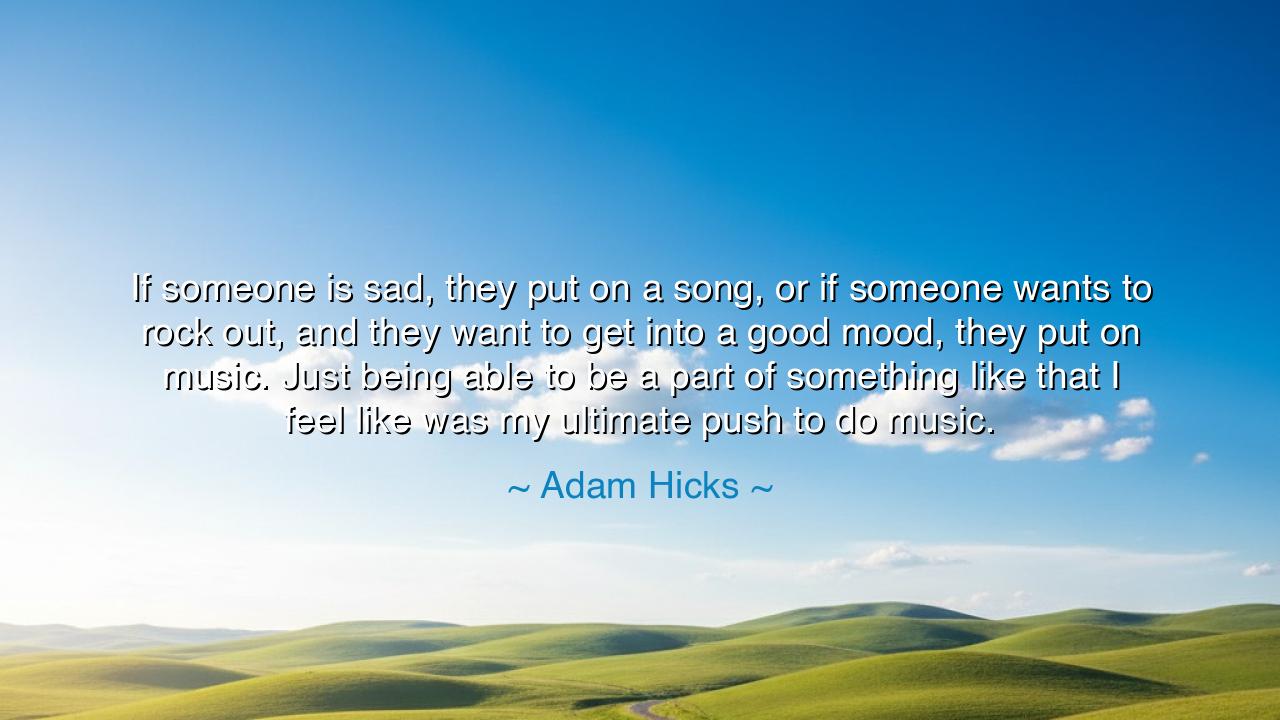
If someone is sad, they put on a song, or if someone wants to
If someone is sad, they put on a song, or if someone wants to rock out, and they want to get into a good mood, they put on music. Just being able to be a part of something like that I feel like was my ultimate push to do music.






Hear now the words of Adam Hicks, spoken with the clarity of one who has felt the fire of song: “If someone is sad, they put on a song, or if someone wants to rock out, and they want to get into a good mood, they put on music. Just being able to be a part of something like that I feel like was my ultimate push to do music.” At first these words seem simple, even common, but hidden within them is a truth as old as humanity itself: that music is not mere sound, but the medicine of the soul, the bridge between sorrow and joy, the language that speaks when all other tongues fall silent.
The ancients knew this mystery well. The Greeks sang of Orpheus, whose lyre could calm the beasts and even soften the heart of Hades. The Hebrews spoke of David, whose harp soothed the troubled spirit of Saul. The tribes of Africa, Asia, and the Americas danced to drums that called down courage, joy, and healing. In every age, when men and women were sad, they turned to song; when they sought to celebrate, they raised their voices in melody. Hicks is not discovering something new, but rather stepping into a river that has flowed since the dawn of time.
What he names as his “ultimate push” is in fact the recognition of music’s divine purpose. For music is not only for the ear; it is for the heart. It gathers us in our solitude and binds us in our communities. When one is broken, a single song may lift them. When many are united, a chorus of voices may ignite revolutions. Recall how in the American Civil Rights Movement, voices rose in hymns and freedom songs. “We Shall Overcome” was not merely melody; it was shield and sword. In the same way, Hicks glimpsed that to partake in music is to partake in power—power that comforts, power that transforms, power that endures.
There is something heroic in the role of the musician. Unlike the warrior who wields steel, the musician wields sound. Unlike the ruler who commands laws, the artist commands hearts. To be a creator of music is to become a servant of emotion itself, shaping the unseen forces that move men and women. Hicks realized that he could not merely enjoy this gift—he was compelled to give himself to it, to become a maker of that which heals both grief and joy. This is not vanity but calling, not fame but responsibility.
We must take care, however, not to treat music as mere escape. To drown ourselves in sound without reflection is to miss its sacred role. True music does not numb; it awakens. True music does not hide sorrow; it honors it, then lifts it toward light. When Hicks speaks of those who are sad, or those who seek a better mood, he reveals the essence of music’s service: it meets us where we are, and carries us where we need to go. It is both mirror and map, showing us our state, and guiding us forward.
The lesson for us, therefore, is this: cherish the gift of music. Do not dismiss it as background, nor consume it thoughtlessly. When you are heavy with grief, seek a song that speaks your sorrow, and let it cleanse you. When you are weary, seek rhythm, and let it stir you to courage. When you are joyful, share your music with others, and let it multiply your gladness. And if you, like Hicks, feel the call to create, do not hesitate—for to offer your music to the world is to offer your spirit itself.
Practical action follows: be deliberate in what you hear. Choose melodies that nurture, rhythms that strengthen, lyrics that uplift. Do not surrender your heart to noise that poisons, but fill it with sound that restores. For music is both seed and harvest; what you plant in your ears will grow in your soul. Let your playlist be your prayer book, your anthems be your shield, your songs be your companions in the lonely hours.
Thus, Hicks’s words, though clothed in simplicity, bear ancient weight. He speaks the truth that every age has known: that music is the unseen hand upon the heart, the eternal companion of both sadness and joy, the reason many rise in the morning and endure through the night. To make music, or even to honor it, is to join the oldest fellowship of humankind. And the wise will not only listen, but live in harmony with the song that unites us all.






AAdministratorAdministrator
Welcome, honored guests. Please leave a comment, we will respond soon